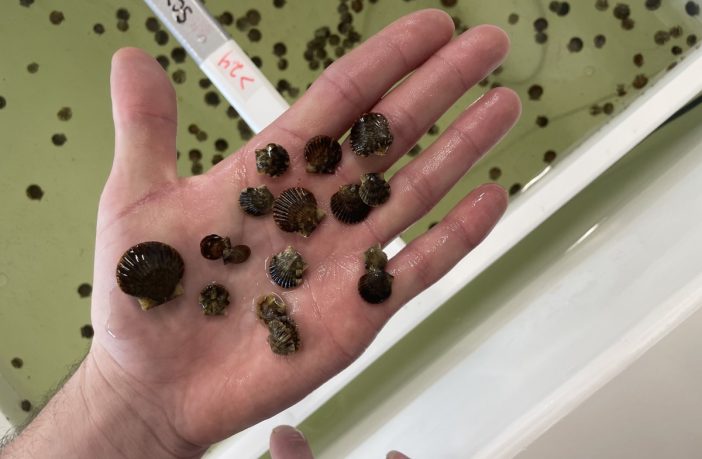With financial help from a Long Island-based foundation, Cornell Cooperative Extension (CCE) of Suffolk’s Marine Program is working to ensure the long-term survival of Peconic Bay scallops by experimenting with a shift in its hatchery spawning from summer to fall.
The Robins Island Foundation is supporting CCE’s first-of-its kind initiative that hopes to boost the bay scallop’s survival rate after four successive years of mass die-offs. CCE’s Bay Scallop Restoration Program has also received ongoing support from Suffolk County – through the county’s Water Quality Protection and Restoration Program – since 2005.
“The CCE Marine Program is committed to the success of commercial fishing here on Long Island, and a large part of our work focuses on the Peconic Bay scallop,” said Chris Pickerell, Director of the CCE Marine Program. “Recent die-offs have made our job more difficult. This new initiative is aimed at ensuring that we can continue to support the fishery and the local economy.”
CCE researchers point to two factors contributing to large-scale die-offs. The first is a rise of water temperatures, universally agreed to be an effect of climate change. The other variable is the emergence of a parasite first documented in the Peconic Bay populations in 2019. According to published reports, the regional industry’s annual scallop harvest in 2020 and 2021 was a fraction of that in 2017 and 2018.
“You can’t overstate the economic and cultural and value of the Peconic Bay scallop to life on the East End,” said Suffolk County Legislator Al Krupski. “I’m proud of the role that Suffolk County has played over more than 15 years to support CCE’s efforts to sustain this vital industry and I’m happy that Robins Island Foundation has decided to also support this important work.”
“We are happy to support the critical work of the scientists at CCE on this important initiative,” said Ann Colley, Executive Director of the Robins Island Foundation. “The scallop fishery is an integral part of both the history and economy of the East End, and we hope that this new approach to spawning is successful, and that Peconic Bay scallops thrive for generations to come.”
Bay scallops typically spawn once in the summer during their second year of life. In past years, the CCE team – working in conjunction with Suffolk County – has succeeded in producing large numbers of summer-spawned bay scallops. The current CCE research focuses on the less common uncommon fall spawning.
In October and November of 2022, CCE’s production hatchery in Southold conducted two successful spawns resulting in approximately 30,000 young scallops that are now in the hatchery. This spring, the restoration team will undertake a range of field experiments to evaluate the hardiness of these fall-spawned scallops. The team will aim to investigate survival rates, reproduction, and infection rates of the fall scallops and compare the results with that of scallops spawned in summer. If fall-spawned bay scallops survive better than those produced in summer, such findings could prove highly useful in future restoration efforts.
“We were excited to attempt the first fall spawn of bay scallops here at the hatchery in Southold,” said Josh Perry, CCE’s Production Hatchery Manager. “Spawning and rearing outside the regular season has been both challenging and exciting. It builds on the dedicated work my colleagues have been doing for many years.”
“It’s promising to produce fall-spawned scallops, but now we need to see if these scallops will survive better than those we produced in summer,” said Harrison Tobi, a CCE Scallop Program Specialist. “I look forward to getting in the water and working with my team in the months to come to learn if what we’re trying will significantly improve scallop survival. I’m confident that we’ll soon be better equipped to restore the fishery back to what it was before the recent die-offs.”
To learn more about CCE’s Scallop Restoration Program, visit www.ccesuffolk.org/marine/aquaculture/scallop-program, www.ccesuffolk.org/marine, and follow on social media @ccemarineprogram.
Inquiries regarding CCE Marine Program bay scallop initiative can be directed to Harrison Tobi at [email protected] or 802-310-3761.











